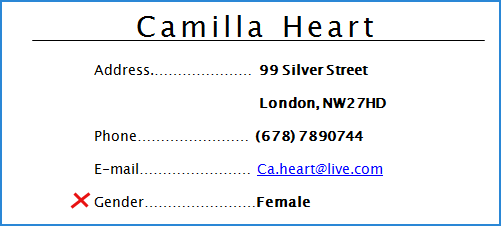 Sobhan Mohmand, Career Expert
Sobhan Mohmand, Career Expert  30 December 2022
30 December 2022

There used to be a time in which it was the common practice to include your gender on your CV, together with other personal information such as date of birth, marital status and nationality.
Over the past two decades, however, this trend has reversed. New laws have been introduced to kerb discrimination in the workplace. It has now become illegal for employers to ask for your gender or sexuality on your CV or to discriminate against you during the hiring process based on your sex.
Stating your gender on your CV tells the employer that you want to be judged based on your biological/genetic makeup instead of your education, experience, skills and abilities!
Furthermore, stating on your CV that you are female could negatively affect your chances of being shortlisted for an interview due to gender bias some recruiters might have.
Gender bias is the unconscious tendency to prefer one sex over another. It refers to the preferential treatment men receive, in particular white, heterosexual males, over females.
Bright et al. write in How to write a brilliant CV (pg.247): “Bias exists in all forms and includes, but is not limited to ethnicity, gender, beliefs and age. Study after study has shown that recruiters are biased either deliberately or unconsciously, and the most successful job candidates are young, white, attractive, middle-class, well-educated males, followed by their female counterparts.”
The prime space in your CV, is the upper half, of the first page of your CV. This part should contain some minimal personal details such as your name, address, telephone number and email address. These details are important because employers use them to contact you.
Mentioning your gender/sex will take up valuable space in your CV that could be used for more important information such as your personal profile statement, achievements, employment history, educational background and skills.
Remember, CVs should not be longer than two A4 pages.
In most cases, writing your gender on your CV serves no purpose.
Consider the following personal details section of an applicant’s CV:

What is the purpose of Camilla mentioning her gender as “female”? It is plainly obvious from her name that she is a female. The same is true for applicants with well-known male names.
Given the reasons mentioned in the previous section, there is now a consensus among career experts that modern CVs should not include any irrelevant or unnecessary personal details such as gender, age or marital status.
Sue Tumelty, a senior HR executive, writes in CV and Interview Handbook (pg.67):
“There are some things that you should never put on a CV. It used to be the norm to include your age, marital status or nationality on a CV. Today such details are regarded as obsolete. Part of the reason behind this is that such information could be used to discriminate against you on grounds of gender, age or ethnicity. It also means that CVs are shorter and more punchy.”
Lynn Williams, career counsellor and author of three careers books, states in her best-selling book Readymade CVs: Winning CVs for Every Type of Job (pg. 12):
“Unnecessary personal details you can safely leave out:
Corinne Mills, a famous career professional and HR executive, writes in You’re hired, how to write a brilliant CV (pg.78):
Don’t include any of the following personal details on your CV:
Tom Jackson, an American career development expert, states in The perfect CV: Stand out from the competition and get the job you really want (pg.83) under the chapter “CV Don’ts”:
“Don’t include information about your gender, age, height and weight, race, religion, state of health, or other personal or family data.”
Some people have names that are unisex such as Chris, Alex, Jordan, Sam and Jean. In this case, it may be beneficial for a candidate to state their gender on their CV if they apply for a role in which the sex of the applicant matters, for example, when applying for modelling or acting roles.
What is the best way to state your gender on your CV?
Instead of writing it prominently at the top of your CV, a good alternative is given by Julie Gray, a professional CV writer, in Get That Job With The Right CV: Teach Yourself (pg.20):
“If you prefer your gender clear – it doesn’t have to be – you can always add a Miss, Ms, Mrs or Mr to your CV and cover letter.”
This method is preferred because it casually informs the employer about your gender without attracting too much attention to it.
As previously mentioned, some recruiters have unconscious gender bias and prefer males over females when shortlisting candidates for job interviews.
This has led some female applicants to take the drastic action of trying to hide their gender on their CVs.
Bright et al. offer the following advice for applicants in this position:
“If you decide to conceal your gender, ethnicity or sexuality on your CV, be sure you do this consistently. If you conceal your gender by using initials rather than first names, stating that you attended Horsham Ladies’ College is a dead giveaway!” (How to write a brilliant CV, pg.247).
1. Employers recognise the contribution of both sexes
Many studies have demonstrated that gender diversity improves team performance or company profitability.
For example, a 2013 study published in Management Science found that teams with an equal gender mix perform better than male-dominated teams in terms of sales and profits (Hoogendoorn et al., (2013), The impact of gender diversity on the performance of business teams: Evidence from a field experiment).
Paul Hichens mentions in The One Page CV: Create your own high impact CV (pg.99):
“If you are female and feel that your gender works against you in your job sector because it is male-dominated then you may be tempted to omit gender from your CV, especially if you have a unisex name such as Kim, Chris, etc. This is understandable because some employers do discriminate against females. Nevertheless, even in male-dominated sectors, some employers recognise the benefits of employing females. Indeed, research has shown that the most effective teams are ones with a good balance of age, gender, skills and background. So if you are a woman in a male-dominated arena, then this may not be such a hindrance as at first appears. And in some cases highlighting your sex on your CV may actually work to your advantage.”
2. Employers are more committed to equal opportunity and gender diversity
In a study conducted by McKinsey & Company in 2012, only 56 per cent of employers were highly committed to gender diversity. A decade later, this number has significantly risen to 87 per cent. This is an indication that employers are moving towards equal opportunities for all applicants, eliminating any deliberate or unconscious gender biases recruiters might have.
Generally, the bigger the organisation, the more likely it is to have equal employment opportunity/affirmative action policies and officers. In theory, this should reduce the problems of bias.

Do you put gender on a CV?
No, a standard CV in the UK, USA and most of Europe should not include the gender of the applicant. The only personal details it should contain are the applicant’s name, address, telephone number and email address. Other irrelevant personal details include age, date of birth, marital status, disability and religious or sporting affiliations.
What are the reasons for not including gender on a CV?
Mentioning your gender on your CV is discouraged for a number of reasons. Firstly, you ask the employer to judge you based on your biological makeup instead of your ability. Secondly, it takes up valuable space on your CV that can be used for more important information. Thirdly, it is unnecessary as employers can usually derive from your name whether you’re a male or female.
Good luck with your job hunt!